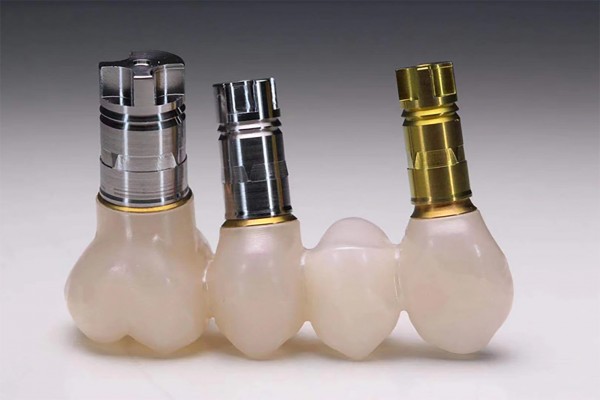The Stockholm Material Hub, a Stockholm Trio collaboration, is working in collaboration with dentists and clinicians to create the next generation of materials for dental implants. The requirements for how an artificial tooth looks, functions and can be manufactured are exceedingly complex, but it seems likely that their zirconia-based materials will be the choice of the future.

False teeth have been around for millennia – made from materials like hippopotamus teeth, wood, gold, noxious early plastics and even the teeth of dead soldiers. Each of these materials was flawed, which is no surprise since the demands on teeth are so complex: strength, stability, compatible with gums and jaws, and a translucent appearance with a glossy surface to match surrounding teeth. Even the current choice, titanium, leaves something to be desired: it has a greyish tint and can weaken the surrounding bones.terials scientists and dental professionals are both interested in creating a better tooth replacement. The Stockholm Material Hub, funded by the EU Regional Development Fund, is dedicated to bringing together researchers from Stockholm University, KTH, and Karolinska Institute to work with small- and medium-sized businesses in developing materials for healthcare, energy, and the environment. In short, the challenge of creating an artificial tooth that is suitable for market is exactly what Stockholm Material Hub was created to address.
James Shen. Professor of Materials and Environmental Chemistry at Stockholm University and Director of Stockholm Matrial Hub, sees the rewards of working closely with practitioners. “Luckily, dentists are among the practitioners who have a strong belief in the power of materials. Throughout history, they have bravely tried almost all materials for solving dental problems. They open their doors for us, but it’s often materials chemists who underestimate the complexity and challenges of dentistry”.
Zirconia ceramic dental materials are the focus of their current research. It improves on titanium because it is more compatible with bone, not to mention its more natural appearance. They are also looking to improve the customisation of the artificial teeth and the time and cost involved in creating them by working with digital, cloud-based manufacturing processes. Their latest conference, held 9-12 October 2020 online, tackled just this topic.
Professor James Shen is looking forward to the continuing success of Stockholm Material Hub generally and the development of advanced ceramics in dentistry specifically by bringing together researchers from diverse disciplines in close dialogue with practitioners. “At Stockholm Material Hub we are aiming at integrating more complementary knowledge and skills together with cross-disciplinary research. The synergy of fundamental research and needs-driven exploration of advanced ceramics and technologies is critical for the development of dentistry in the digital era”